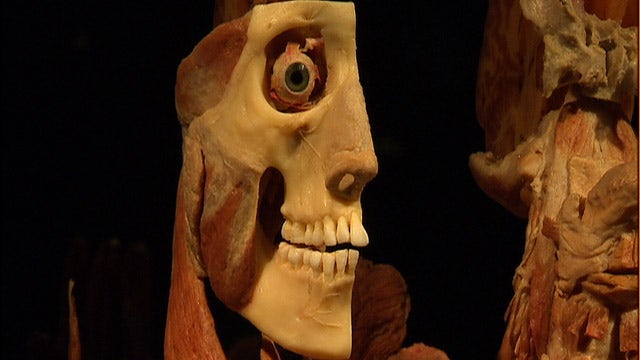Donating your body to science?
When you step into the “Body Worlds” exhibit in New York’s Times Square you’ll find a unique collection of nearly 200 human specimens. Each is preserved and on display to help people strive towards a healthier life
At the “Body Worlds” exhibit in New York’s Times Square, visitors will find a unique collection of nearly 200 human specimens on display – from full bodies to single organs.
Donated human organs, presevered through a process called plastination, were first used to teach anatomy at universities. With the “Body Worlds” exhibit, they are being used to teach viewers important lessons about health.
"People really feel inclined to strive towards a healthier life, stop smoking, strive for healthier food, exercise (and) more,” said Dr. Angelina Whalley, the curator of the “Body Worlds” exhibit. “So, that's really very educational, but also (an) emotional experience that people have in ‘Body Worlds.’”
Whalley and her husband, who invented the plastination process, have been curating these exhibits around the world since 1995.
The “Pulse” exhibit, displayed in New York, shows the effects that disease, the environment and lifestyle choices have on a person’s health. Among the items on display are a heart that suffered a heart attack, a spleen that became enlarged due to leukemia, a smoker’s lung and a brain that had suffered a stroke.
Another exhibit shows lungs from a donor who lived in a big city. Viewers can see black dots on the organ, from where smog and pollution took their toll.
"Normally we think of our body only when it is distressed, when it is diseased,” Whalley said. “We normally take it for granted but we are…living in a stressful world, and also generations get older and older. It is our responsibility to stay healthy over (our) lifetime. The fate of our body is really in our hands."
The body donation program was started in the 1980s and has had more than 13,000 volunteers.
Hollis Waite, 37, says he is donating his body to science after he dies, because he was taught not to be wasteful.
When Waite first visited the “Body Worlds” exhibit, he didn’t have health insurance – but he quickly changed that after seeing the displays.
"I'm hoping that they can show me as the longest lasting person, someone who is advanced age, as an example of that,” Waite said.
For more information, go to BodyWorlds.com.









































